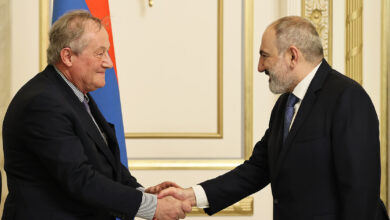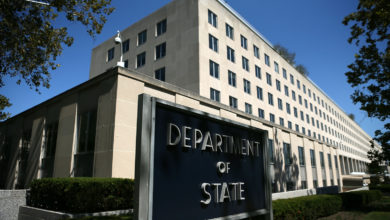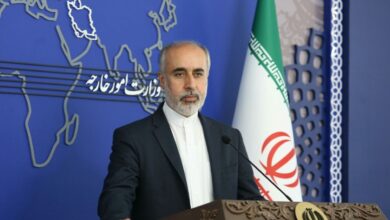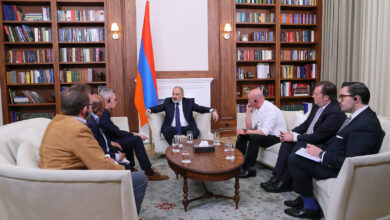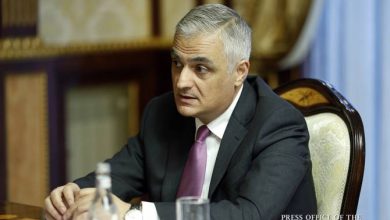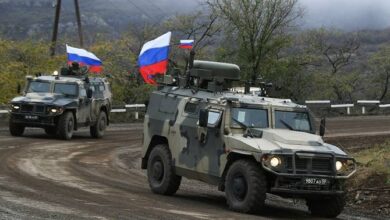Armenian President says hopes US recognition of the Armenian Genocide is matter of “when,” not “if”
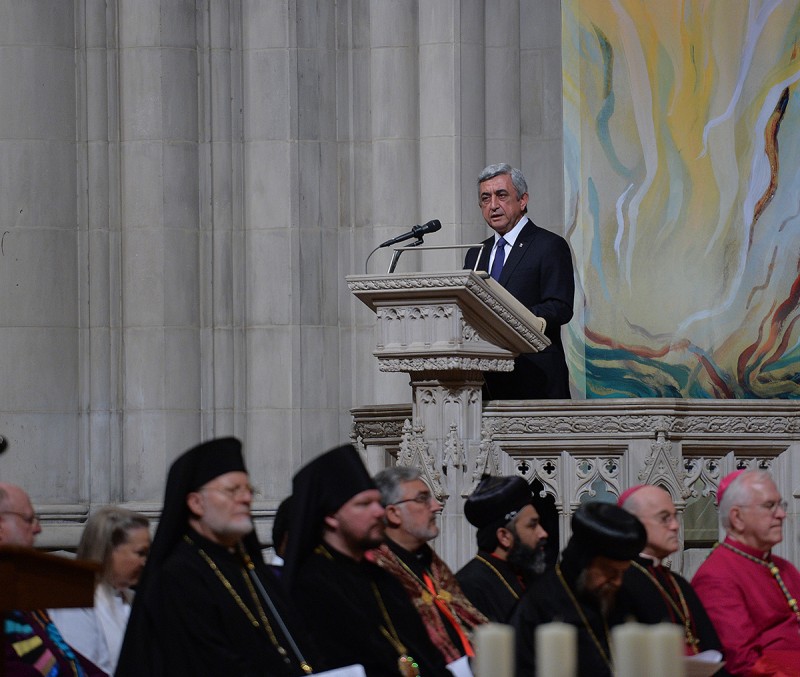
On the evening of May 7, President Serzh Sargsyan, who has paid a working visit to the United States of America, took part in an interreligious prayer in memory of the Armenian Genocide victims which was performed at Washington National Cathedral. The president was accompanied by His Holiness Karekin II, Supreme Patriarch and Catholicos of All Armenians, and Aram I, Catholicos of the Great House of Cilicia. The Armenian president delivered a speech. The interreligious prayer service was also joined by U.S. Vice-President Joe Biden, U.S. Ambassador to the UN Samantha Power, Katharine Schori, Presiding Bishop of the Episcopal Church of the United States, Olav Fykse Tveit, Secretary-General of the World Council of Churches, numerous clergymen, thousand members of the Armenian-American community, American diplomats, as well as by public and political figures.
Address by RA President Serzh Sargsyan at Washington National Cathedral
Distinguished Vice President Biden,
The Most Reverend Doctor Katharine Jeffers Schori,
Reverend Doctor Olav Fykse Tveit,
Your Holiness Catholicos of All Armenians Garegin II,
Your Holiness Catholicos of the Great House of Cilicia Aram I,
Eminences,
Ladies and Gentlemen,
It is a great honor to speak at the Washington National Cathedral: a cathedral, the foundation of which contains a stone brought from Bethlehem, the birthplace of Christ, inscribed “The Word was made flesh and dwelt among us.”
The eminent advocate of equal rights, Martin Luther King, who had a dream of achieving justice and peace, delivered his last Sunday sermon exactly from this Cathedral.
This Cathedral also houses the tomb of Woodrow Wilson, the 28th President of the United States, who made an exceptional contribution with introducing and upholding liberal, moreover, idealist ideology in international affairs. He was considered an idealist, and it was exactly that ideology that paved the way to establish the system of international organizations, set the first examples of international protection of the human and citizen rights, and to introduce the people’s right to self-determination and legal equality. In the memory of the Armenian people, he will always remain as an international leader who reached out with a helping hand, one whose vision was fair regarding the need to overcome the aftermath of the Armenian Genocide.
Hence, it is symbolic that for the first time today, an ecumenical prayer service is held at this Cathedral to commemorate the innocent victims of the Armenian Genocide, and the Psalm will be heard: “Mercy and truth are met together; righteousness and peace have kissed each other.”
It was the failure of mercy and humanity a century ago that made 1.5 million Armenians fall victim to the slogan “murder because they are different,” was it not? It was the failure of justice and peace, that led to the murder of 6 million Jews, was it not? It was the failure of humanity and solidarity that made possible the Genocidal pages of Cambodia, Rwanda, and Darfur to be written into the history books, was it not? It is the failure to consolidate and to act in a timely manner that makes the minorities in the Middle East today walk the same infernal path as Armenians, Jews, Tutsis, and the Sudanese walked it, is it not?
Unfortunately, the response to all these questions is affirmative. Unfortunately, we all have to confess that, as an international community, we lack reliable mechanisms to prevent these phenomena. Moreover, we witness an escalation of violent practices and cynical comments.
Distinguished partakers,
In the United States of America, this cradle of diversity and pluralism, democracy and liberty, I address you with gratitude as numerous countries and nations of the word came together anew this year, the year of commemorating the Centennial of the Armenian Genocide. They came together in an international effort against the crimes of genocide, and declared that their unity to restore justice and help the truth win. This ecumenical prayer of solidarity is a brilliant act of such unity.
Ladies and Gentlemen,
In our century-long struggle for justice and truth, we have constantly felt the support of the USA, among other nations. Many more would have died and the fate of many survivors would have been more cruel, had friendly countries, including the USA, not stood by the side of our people in that difficult period. William Saroyan, the great Armenian American, said: “here Armenians, who have survived the genocide met, laughed, prayed again in their mother tongue, and created a new Armenia.”
Back in the late 19th century, progressive American public and political figures strongly condemned the anti-Armenian policy of the Sultan’s government and reached out a helping hand to the outcast Armenians. One cannot forget the heroic and exceptional mission of Clara Barton, the founder of the American Red Cross, to help Armenian suffering on the other side of the Ocean. American society voiced their protest during 1915-1923 as well, against the mass killing and deportation of the Armenians, which was subsequently designated as genocide. Every day, the American press printed the eyewitness accounts of diplomats and missionaries that saw these tragic events, and of Armenians saved by miracle. The name of Henry Morgenthau, the United States Ambassador to the Ottoman Empire, is inscribed eternally in golden letters in the list of friends of Armenians. Back in the day, he became the first American to tell the world about the mass atrocities of the Young Turks against the Armenian people, calling the Armenian Genocide “a campaign to exterminate a race.” The Armenian people will forever remember the hundreds of Americans that established orphanages in Armenia, the Middle East, and Europe, to save and to look after dozens of thousands of Armenian orphans that had survived the Genocide.
Recently, in the United States numerous initiatives have been launched to unambiguously asses the Armenian Genocide. The striking illustration of what I just said is the sole fact that 44 of the States have already recognized and condemned that crime against humanity. I hope that the complete US recognition of the Armenian Genocide is not a matter of “if” but of “when.”
Distinguished partakers,
Henry Morgenthau wrote in his memoir that as Armenians left their homes under the threat of the Turkish yataghan, the very homes in which their ancestors had lived for 2,500 years, they would say: “Pray for us.” A few days ago, the Armenian Apostolic Church canonized the innocent victims of the Armenian Genocide: henceforth, the one and a half million martyrs are already saints. As we pray for them, let us pray, and demand truth and justice. Let this demand always remain awake and to ring, to ring as the hundred bells of churches rang around the world on the eve of the Centennial. Let us try together to bandage the wounds of humanity in order to achieve justice and peace for us and around the world.
Thank you.


